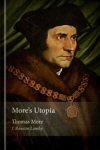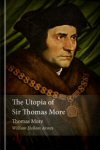Critical Commentaries and Studies on Thomas More’s Utopia (5 vols.)
Digital Verbum Edition
This product has been transferred from Community Pricing to Pre-Pub. The actual funding level may be lower than it appears, which could delay production. The amount of funding still needed will be evaluated and updated soon.
Overview
The end of the Middle Ages is marked by the ascendance of human reason. The early modern philosophy that emerged became transfixed with crafting a design for the ideal state. Thomas More’s Utopia was one of the first works in a wave of treatises on the perfect society, and the title of his work soon came to define the genre as Francis Bacon, Milton, Voltaire, and others contributed their own narratives to the utopian canon as it eventually transformed into the dystopian genre later embodied by the works of Jack London, George Orwell, and Aldous Huxley.
These volumes contain a wealth of critical analysis of More’s Utopia. Scholars examine the reception of Thomas More and his Utopia through the years, as well as its impact on political philosophy. They also provide valuable biographical and contextual information that aid in interpreting More’s expedition of this idyllic island. These works will help readers gain a deeper appreciation of More’s artistry and legacy.
With the Logos edition, these valuable volumes are enhanced by cutting-edge research tools. Important terms link to dictionaries, encyclopedias, and a wealth of other resources in your digital library. Powerful topical searches help you find exactly what you’re looking for. Tablet and mobile apps let you take the discussion with you. With Logos, the most efficient and comprehensive research tools are in one place, so you get the most out of your study.
Check out the Select Life and Works of Thomas More (8 vols.)
Key Features
- Provides insight into the beginning to the Utopian/Dystopian literary tradition
- Includes critical analysis and interpretation of Thomas More’s Utopia
- Presents biographical and contextual information on More and his work
Product Details
- Title: Critical Commentaries and Studies on Thomas More’s Utopia
- Volumes: 5
- Pages: 1,794
- Resource Type: Literature
- Topic: Political Philosophy
Individual Titles
- Utopia: The Happy Republic: A Philosophical Romance edited by J.A. St. John
- More’s Utopia edited by William Roper and J. Rawson Lumby
- Sir Thomas More’s Utopia edited by J. Churton Collins
- The Utopia of Sir Thomas More edited by Joseph H. Lupton
- The Utopia of Sir Thomas More edited by William Dallam Armes

J.A. St. John’s edition of Utopia examines More’s work in the context of Plato’s own theories of the ideal state in the Republic. It also includes the utopian narrative, The New Atlantis, by Francis Bacon. St. John’s volume provides a valuable window into the string of utopian literature throughout Western literature from Plato to modern times.
James Augustus St. John (1795–1875) was a British author and traveler. He was fluent in the French, Italian, Spanish, Arabic, and Persian languages. He established the London Weekly Review (later the Court Journal) and regularly contributed to the Daily Telegraph.

Containing William Roper’s highly regarded biography of Thomas More and an introduction with extensive notes from Cambridge scholar J. Rawson Lumby, this volume provides key context and interpretative handholds for More’s Utopia. Roper (More’s son-in-law), documents the most important events in More’s life that began with great political success and ended with martyrdom.
William Roper (1496–1578) was an English biographer and the son-in-law of Thomas More.
J. Rawson Lumby was Lady Margaret Professor of Divinity at Cambridge University.

Literary critic J. Churton Collins digs into the origin and inspiration of Thomas More’s Utopia. Churton outlines the framework of Utopia, its plot, and More’s intent in creating the idyllic island. Churton also analyzes the publication and translation history of Thomas More’s text. This volume is an excellent literary introduction the Utopia that enables a deeper appreciation of More’s artistry.
John Churton Collins (1848–1908) was a British literary critic. Collins attended Balliol College, Oxford and became professor of English literature at Birmingham University.

Thomas More’s Utopia began a great tradition of Utopian literature. Joseph H. Lupton compares More’s work with the other great works in the genre. Lupton also provides helpful biographical context and insight into how More conceived of and executed his narrative of the ideal commonwealth.
Joseph H. Lupton (1836–1905) was a nineteenth-century biographer and poet.

William Dallam Armes’ introduction to Utopia examines Thomas More as one of the pioneers of the renaissance in England. Armes also provides helpful notes and a glossary that aids in understanding More’s Utopia and its place in the literary world.
William Dallam Armes was professor of American Literature at the University of California.
About Thomas More
Thomas More (1478–1535) was an English lawyer, political philosopher, poet, and statesman. He was an important councilor to Henry VII, serving as Lord Chancellor from 1529–1532. He was an aggressive opponent of the Protestant Reformation. He lost much of his political clout due to his opposition to the King’s separation from the Catholic Church, a stance which eventually led to his execution for treason.
More is most remembered for his fictional work of political philosophy, Utopia. Pope Pius XI canonized More in 1935, and Pope John Paul II declared More to be the “heavenly Patron of Statesman and Politicians.” His commitment to his religious convictions in the face of persecution, imprisonment, and execution contributed much to his posthumous reputation.